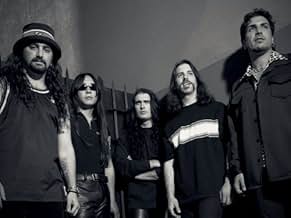Metal Evolution
- Série télévisée
- 2011–2014
NOTE IMDb
8,5/10
2,8 k
MA NOTE
Ajouter une intrigue dans votre langueA journey through heavy metal's roots and evolution, featuring interviews with rock legends and industry insiders. Myths are challenged as the genre's depth and impact are revealed through c... Tout lireA journey through heavy metal's roots and evolution, featuring interviews with rock legends and industry insiders. Myths are challenged as the genre's depth and impact are revealed through candid talks with stars from iconic bands.A journey through heavy metal's roots and evolution, featuring interviews with rock legends and industry insiders. Myths are challenged as the genre's depth and impact are revealed through candid talks with stars from iconic bands.
- Récompenses
- 1 nomination au total
Parcourir les épisodes
Avis à la une
Canuck head banger Sam Dunn examines the evolution of heavy metal from the same anthropological viewpoint as his "Metal" documentary films. Metal Evolution is more of the same globe-trotting adventures of Dunn and crew as they examine the origins of the beast from the smoking cauldrons of Birmingham to the back streets of New York in the 1970s.
Dunn plays to his audience and those uninterested in metal might not really enjoy such a detailed examination of the various sub-genres of metal. For those who are more denim and leather inclined, metal evolution provides a treasure trove of interviews with such "metal gods" as Rob Halford, Geezer Butler, and even such "proto-punk"(I hate that term) legends as Iggy Pop. Dunn is entirely methodical in his examination of the genre, and this is clearly a labour (yes I am Canadian, that is a U) of love for Dunn.
What is truly great about Metal Evolution is the sheer grandiosity of the examination. Every major sub-genre is covered (Yes, even the much maligned "Nu-Metal"). If the words "Black Metal, Death Metal, and Power Metal" don't strike any chords in your hardened heart, then Metal Evolution will probably not be worth your time. I truly loved every minute of this series so far, and it is great to see such a documentary in the era of "bands" (I use the term loosely) such as LMFAO and Hedley who are about as heavy as non-alcoholic Labatt's. Yes, Metal (CAPITAL!!!) is back and Dunn's examination proves once and for all that metal is not for the weak, nor is it for the unenlightened. Dunn, a University Graduate and scholar proves that metal is an intensely complex genre full of musical diversity and a list of "characters" that are equally complex. Overall, an absolute must for anyone who has been known to throw up the horns in salute to the world's most misunderstood form of music. METTTTTTTAALLLLLLLLLLLL!!!!!!!
Dunn plays to his audience and those uninterested in metal might not really enjoy such a detailed examination of the various sub-genres of metal. For those who are more denim and leather inclined, metal evolution provides a treasure trove of interviews with such "metal gods" as Rob Halford, Geezer Butler, and even such "proto-punk"(I hate that term) legends as Iggy Pop. Dunn is entirely methodical in his examination of the genre, and this is clearly a labour (yes I am Canadian, that is a U) of love for Dunn.
What is truly great about Metal Evolution is the sheer grandiosity of the examination. Every major sub-genre is covered (Yes, even the much maligned "Nu-Metal"). If the words "Black Metal, Death Metal, and Power Metal" don't strike any chords in your hardened heart, then Metal Evolution will probably not be worth your time. I truly loved every minute of this series so far, and it is great to see such a documentary in the era of "bands" (I use the term loosely) such as LMFAO and Hedley who are about as heavy as non-alcoholic Labatt's. Yes, Metal (CAPITAL!!!) is back and Dunn's examination proves once and for all that metal is not for the weak, nor is it for the unenlightened. Dunn, a University Graduate and scholar proves that metal is an intensely complex genre full of musical diversity and a list of "characters" that are equally complex. Overall, an absolute must for anyone who has been known to throw up the horns in salute to the world's most misunderstood form of music. METTTTTTTAALLLLLLLLLLLL!!!!!!!
If you are a fan of metal in any kind - YOU MUST SEE THIS. However, it is interesting for people that don't even like metal music. My sister is not a fan but, she's almost more into this show than I am. I love metal and I love the fact that this show explores all the different genres. I hate the fact that people that don't like metal think it's all just violence and anger. For some bands it is but, however, there are so many different forms of metal that some people would even be surprised to learn that certain bands are even considered metal. The cool thing about this show is that even if there is a band that I absolutely hate on it, it's equally as interesting and entertaining when there's a band I love. This is one the greatest shows on TV right now and I hope that it can open at least one person's eyes to what metal really is.
I was pleasantly surprised to see that this documentary series about heavy metal was by the same person who made the documentary "Metal: a headbanger's journey" (reviewed at this site)...Sam Dunn. Sam grew up being a fan of the genre and also went on to become an academic anthropologist, so he is quite articulate in his analysis of the music he is so passionate about.
In this series he looks at the influences of heavy metal (odd suggestions like jazz and classical music as well as the more predictable genres like blues), as well as the variety of forms the genre has split into...episodes are devoted to such topics.
Not sure if I have all of my notes on this series on hand, but of the notes that I do have, here are some things that I noted or would have liked more information on etc:
* Black Sabbath's famous self-title song started out by their bass player - 'Geezer' Butler - playing classical composer Gustav Holst's doomy piece "Mars". Black Sabbath's guitarist Tony Iommi liked what Butler was playing and played that classically inspired riff on guitar...and that became their famous self-titled song. Holst's 'riff' was played by brass instruments (e.g. Tuba) on his composition.
* There was some old black and white footage of rock'n'roll pioneer Jerry Lee Lewis playing a song on his piano in front of a studio audience. It looked to me like the teenage males were headbanging to the music! * I would have liked some more depth to the interviews sometimes. E.g. Just from a curiosity standpoint I would have liked to have known why Saxon's Bruce Dickinson decided to join Iron Maiden. Did Bruce feel that Iron Maiden had a better chance at commercial success than Saxon? History has borne that out in any case.
* An episode devoted to more extreme forms of heavy metal would have been appreciated. When I surf radio stations - so to speak - I sometimes come across programmes devoted to heavy metal and often you'll hear heavily distorted vocals and/or very fast rhythms. So, I think that genres like speed metal, death metal and black metal could have been focused on in one episode at least. Or even an episode devoted to more fruity varieties of heavy metal...bands with opera singers or which use symphonic orchestration...stuff like that.
In any case, there are lots of interesting clips and interviews with the musicians etc. Sometimes it feels that Sam pretends to be ignorant on musical matters in order to illuminate for the fan something about the genre...or perhaps it is a process he actually went through and is replaying it for the benefit of the audience...an example would be when he wonders about the influence of jazz on heavy metal.
There are 11 episodes in this series...I think each episode was around the 50 minute length mark. Topics and bands range from the well known to the obscure.
In this series he looks at the influences of heavy metal (odd suggestions like jazz and classical music as well as the more predictable genres like blues), as well as the variety of forms the genre has split into...episodes are devoted to such topics.
Not sure if I have all of my notes on this series on hand, but of the notes that I do have, here are some things that I noted or would have liked more information on etc:
* Black Sabbath's famous self-title song started out by their bass player - 'Geezer' Butler - playing classical composer Gustav Holst's doomy piece "Mars". Black Sabbath's guitarist Tony Iommi liked what Butler was playing and played that classically inspired riff on guitar...and that became their famous self-titled song. Holst's 'riff' was played by brass instruments (e.g. Tuba) on his composition.
* There was some old black and white footage of rock'n'roll pioneer Jerry Lee Lewis playing a song on his piano in front of a studio audience. It looked to me like the teenage males were headbanging to the music! * I would have liked some more depth to the interviews sometimes. E.g. Just from a curiosity standpoint I would have liked to have known why Saxon's Bruce Dickinson decided to join Iron Maiden. Did Bruce feel that Iron Maiden had a better chance at commercial success than Saxon? History has borne that out in any case.
* An episode devoted to more extreme forms of heavy metal would have been appreciated. When I surf radio stations - so to speak - I sometimes come across programmes devoted to heavy metal and often you'll hear heavily distorted vocals and/or very fast rhythms. So, I think that genres like speed metal, death metal and black metal could have been focused on in one episode at least. Or even an episode devoted to more fruity varieties of heavy metal...bands with opera singers or which use symphonic orchestration...stuff like that.
In any case, there are lots of interesting clips and interviews with the musicians etc. Sometimes it feels that Sam pretends to be ignorant on musical matters in order to illuminate for the fan something about the genre...or perhaps it is a process he actually went through and is replaying it for the benefit of the audience...an example would be when he wonders about the influence of jazz on heavy metal.
There are 11 episodes in this series...I think each episode was around the 50 minute length mark. Topics and bands range from the well known to the obscure.
Put simply - to date (2022) this is the best heavy metal music documentary. The author really tried hard to explore the origins of nearly every subgenre and the genre as a whole and the directions it is heading. Plenty of metal legends interviews, everything is greatly structured, great camera work and great editing.
My only remarks are these: the company behind the documentary seems to explore North America and UK music only and fails to understand what is really going on when it goes East of UK. This applies both to "Metal Evolution" and "This is Pop" which is now on Netflix. So speaking of North America and UK everything is fine, everything is explained in great detail and well structured. But once they go to the actual part of Europe is where things go bad, because both movies show lack of proper understanding of both the European music roots and the European music culture. To be honest I will credit only these two documentaries, as these two are the only ones I have seen entirely. So far I started "Hip Hop Evolution", but I am still not past Season 1 Episode 4, so will refrain from commenting this one.
As for "Metal Evolution", there are basically few weak points. First thing I noticed was also lack of enought attention towards Sepultura. Sepultura was iconic superstar band in the trash era and they barely mentioned it. Sure, they used "trash legends" when mentioned it and there was a short interview with Max Cavalera, but that was it. There was nothing about the innovative solo sound which Andreas Kisser tried to do either. But Sepultura is a Brasilian band. So maybe Banger Films fail to properly understand everything which is outside North America and UK, not just Europe.
I don't think there was enough depth shown for the death metal genre either. Also while not a metal band, I think Red Hot Chilli Peppers deserved a proper mentioning in the grunge episode.
One other thing missing was mentioning the Goth metal genre and the industrial genre. However I assume there was not enough budget for these. Still - goth metal was huge in the mid 90s to the mid 2000s approximatelly, pioneered by the legendary Paradise Lost and this band was more than deserving to be shown. Speaking of industrial, this could be a huge topic, but mentioning at least Front 242, Ministry and KMFDM was needed.
One serious flaw I noticed was the power metal episode. Dude, how is it possible you did not properly understood what power metal is about ?? Sure, there was some imagery with bands like Manowar, but hell the power metal (and the speed metal and so on) was never about that! Helloween (respectively Gamma Ray), Blind Guardian and the rest - these are first and foremost about musicianship - all of them are amazing musicians. The hell - listen to some covers they did - everything is amazing, the same way as once a friend of mine could not differentiate Dream Theater doing a Kansas song cover. In the case of Blind Guardian for example or Gamma Ray - the covers they do are signed with a signature tones, very distinguishable. So first and foremost as I said - this metal is about being a great musician. Then the litemotif of the entire genre is the narrative - it is not just the European folklore, yes it started there, but it could be anything - it is all about a well told story. Yes - storytelling!! Expanding the J. R. R. Tolkien narrative with some new ornaments, adding a brush stroke on the Dune universe ("Traveler in Time" -Blind Guardian) or Stephen King (again Guardian) or praising the pirate adventures (Running Wild) or the good times of Nightwish with Tarja and the stories they have told! Why do you think we all listen to this music - it inspires us to dream with the stories they tell and this is exactly why bands like Blind Guardian put bard pictures on their covers, because it is all about storytelling! It may started with Rainbow and R. J. Dio continued in albums like "Holy Diver", but it lives on! For the sake of everything, the catchy melodies come in the very end of the whole thing!! Stick this in your pipe and smoke it once and for all!!
I also noticed there was nothing about the symphonic metal genre, which evolved out of the power metal to me and was and I guess to a degree is still a huge hit in Europe. But for example the super-famous album "Theli" of Therion came out in 1996, so no excuse a documentary in 2011 not to mention it. Therion pioneered the genre and lead hordes of Scandinavian bands after them.
No mentioning of the doom metal as well. Bands as Asphyx need a serious mention here.
And there were some experimental bands which also needed few words to be told, like Tiamat for example.
Anyway. I will attribute all this to the lack of budged, except the fail to understand the power metal. Everything else was fine, well researched and well told.
I still recommend watching this in 2022.
My only remarks are these: the company behind the documentary seems to explore North America and UK music only and fails to understand what is really going on when it goes East of UK. This applies both to "Metal Evolution" and "This is Pop" which is now on Netflix. So speaking of North America and UK everything is fine, everything is explained in great detail and well structured. But once they go to the actual part of Europe is where things go bad, because both movies show lack of proper understanding of both the European music roots and the European music culture. To be honest I will credit only these two documentaries, as these two are the only ones I have seen entirely. So far I started "Hip Hop Evolution", but I am still not past Season 1 Episode 4, so will refrain from commenting this one.
As for "Metal Evolution", there are basically few weak points. First thing I noticed was also lack of enought attention towards Sepultura. Sepultura was iconic superstar band in the trash era and they barely mentioned it. Sure, they used "trash legends" when mentioned it and there was a short interview with Max Cavalera, but that was it. There was nothing about the innovative solo sound which Andreas Kisser tried to do either. But Sepultura is a Brasilian band. So maybe Banger Films fail to properly understand everything which is outside North America and UK, not just Europe.
I don't think there was enough depth shown for the death metal genre either. Also while not a metal band, I think Red Hot Chilli Peppers deserved a proper mentioning in the grunge episode.
One other thing missing was mentioning the Goth metal genre and the industrial genre. However I assume there was not enough budget for these. Still - goth metal was huge in the mid 90s to the mid 2000s approximatelly, pioneered by the legendary Paradise Lost and this band was more than deserving to be shown. Speaking of industrial, this could be a huge topic, but mentioning at least Front 242, Ministry and KMFDM was needed.
One serious flaw I noticed was the power metal episode. Dude, how is it possible you did not properly understood what power metal is about ?? Sure, there was some imagery with bands like Manowar, but hell the power metal (and the speed metal and so on) was never about that! Helloween (respectively Gamma Ray), Blind Guardian and the rest - these are first and foremost about musicianship - all of them are amazing musicians. The hell - listen to some covers they did - everything is amazing, the same way as once a friend of mine could not differentiate Dream Theater doing a Kansas song cover. In the case of Blind Guardian for example or Gamma Ray - the covers they do are signed with a signature tones, very distinguishable. So first and foremost as I said - this metal is about being a great musician. Then the litemotif of the entire genre is the narrative - it is not just the European folklore, yes it started there, but it could be anything - it is all about a well told story. Yes - storytelling!! Expanding the J. R. R. Tolkien narrative with some new ornaments, adding a brush stroke on the Dune universe ("Traveler in Time" -Blind Guardian) or Stephen King (again Guardian) or praising the pirate adventures (Running Wild) or the good times of Nightwish with Tarja and the stories they have told! Why do you think we all listen to this music - it inspires us to dream with the stories they tell and this is exactly why bands like Blind Guardian put bard pictures on their covers, because it is all about storytelling! It may started with Rainbow and R. J. Dio continued in albums like "Holy Diver", but it lives on! For the sake of everything, the catchy melodies come in the very end of the whole thing!! Stick this in your pipe and smoke it once and for all!!
I also noticed there was nothing about the symphonic metal genre, which evolved out of the power metal to me and was and I guess to a degree is still a huge hit in Europe. But for example the super-famous album "Theli" of Therion came out in 1996, so no excuse a documentary in 2011 not to mention it. Therion pioneered the genre and lead hordes of Scandinavian bands after them.
No mentioning of the doom metal as well. Bands as Asphyx need a serious mention here.
And there were some experimental bands which also needed few words to be told, like Tiamat for example.
Anyway. I will attribute all this to the lack of budged, except the fail to understand the power metal. Everything else was fine, well researched and well told.
I still recommend watching this in 2022.
Metal Evolution is an 11 episode documentary that looks at the influence of Heavy Metal and chronologically how it changed stylistically to form the different genres, glam, power metal, death, trash etc. It starts with how heavy metal came to be in the 70s, what influenced the musicians to create this new form of music. Personally I found it rather generic as it can be argued that most if not all forms of modern music can directly draw its roots from classical, jazz or blues. From there it follows a chronological timeline from the 70s to the present day. Each episode ends with how the genre in that episode led to another genre. So each new episode is a new genre. The narrative includes the narrotors personal view of the music as well as interviews with musicians, magazine editors, music writers and even anthropologist. Some of the linkage IMO is rather far fetched, example is grunge being a genre of metal. Yes it can be argued that some grunge musicians listened metal and definitely grunge happened as a backlash to glam metal. But stylistically grunge is more a descendant of punk. (creed was totally disavowed by all...hahahaha). In summary an entertaining piece of work with a lot of information and personal perspective from the musicians involved.
Le saviez-vous
Meilleurs choix
Connectez-vous pour évaluer et suivre la liste de favoris afin de recevoir des recommandations personnalisées
- How many seasons does Metal Evolution have?Alimenté par Alexa
Détails
- Date de sortie
- Pays d’origine
- Langue
- Aussi connu sous le nom de
- Hårdrockens historia
- Société de production
- Voir plus de crédits d'entreprise sur IMDbPro
- Couleur
Contribuer à cette page
Suggérer une modification ou ajouter du contenu manquant

Lacune principale
By what name was Metal Evolution (2011) officially released in India in English?
Répondre






























